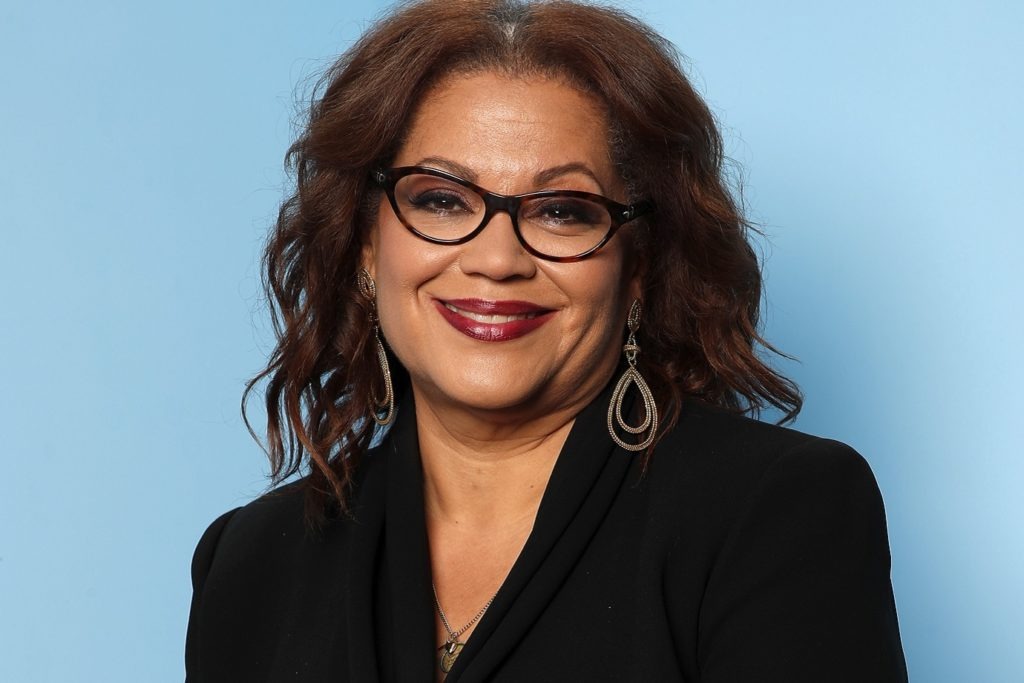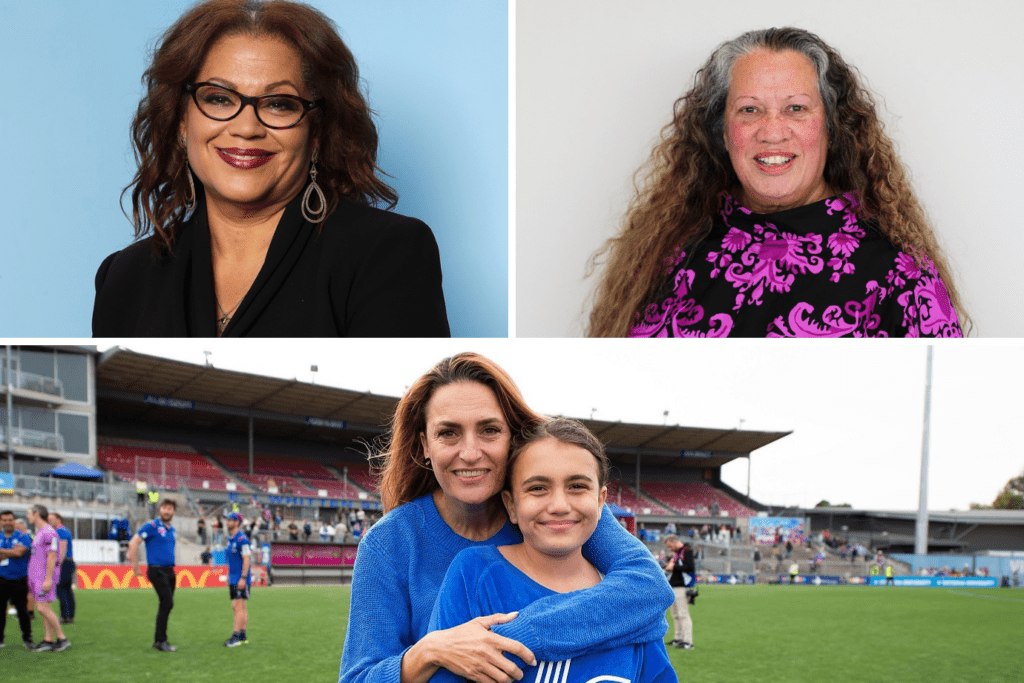This week marks the AFLW’s annual Indigenous Round, dedicated to acknowledging the significant contribution of Aboriginal and Torres Strait Islander peoples to the football community and broader society.
To acknowledge and celebrate the occasion, Women’s Agenda spoke with some leading First Nations women within AFL and AFLW, and asked them to share what the Indigenous Round means to them, and some of the work they are doing within the sport.
Tanya Hosch, Professor Colleen Hayward and Belinda Duarte have each shared their thoughts below.
Tanya Hosch, Executive General Manager Inclusion & Social Policy AFL

Could you share a bit about why the AFLW’s Indigenous round is so important for the game, its players, and the wider community?
It’s important because Aboriginal and Torres Strait Islander peoples are the first peoples of our nation. Our cultures, perspectives and contributions to the nation and the game are significant so the opportunity to acknowledge this, celebrate this, highlight this and profile the contributions of Indigenous women in are game is our privilege, and our responsibility.
It was also very much the wish of all AFLW players that they have their moment to join together in this effort to be part of it and learn as a result, enabling further learning for all who are involved and support the game.
What are some of the achievements you’re most proud to have accomplished/witnessed in the AFLW when it comes to achieving greater inclusion?
I’m proud that Indigenous contributions in footy are going from strength to strength in coaching pathways (Kirby Bentley & Jacara Egan to name a few), in playing the game, all around the country at community level and in the Elite level of the game. Importantly the increase of Indigenous people in the governance of the AFL and Clubs is critical to further growth, cultural capability and equity.
Is there a particular message you’d like others to know as we acknowledge and celebrate the Indigenous round?
There is so much necessity and opportunity from the contributions of Indigenous women in our game and there have been and are many who work so hard behind the scenes supporting players, coaches, teams, programs better. The game is better because of all of these women, and they have and still are teaching me so much.
Professor Colleen Hayward, Fremantle Football Club board director

Could you share a bit about why the AFLW’s Indigenous round is so important for the game, its players, and the wider community?
The AFL generally has the power to influence through its leadership on key issues. The role of Indigenous people in all aspects of the game is one of those key issues. Australian Rules football is a game that is unique to Australia, just as Aboriginal and Torres Strait Islander people are unique to this country. The Indigenous round gives us all the opportunity to recognise, acknowledge and celebrate that uniqueness. It is something for everyone regardless of their own cultural background. It is part of the support we can give Indigenous players, officials, employees, members and other fans as we stand together.
Sport has always been an equaliser where we can all be treated equally and respectfully regardless of what else may be happening in our lives. Australian Rules is even more so given the high proportion of Indigenous players relative to all other aspects of Australian life. That is surely something worth celebrating!
What are some of the achievements you’re most proud of at the club, and in the AFLW more broadly, since joining the board at Fremantle?
The Fremantle Football Club (FFC) is proud to be one of the inaugural clubs to have a women’s team. Among other things, it has enabled us to add to and do more than we were already doing in the Indigenous space. That long-term support ranges from the design of our Indigenous guernsey; the involvement of past Indigenous players in the design process; Aboriginal cultural awareness learning; the building of understanding between people from diverse backgrounds; the inclusion of acknowledgements in our Club signature blocks and the Welcomes to Country at all major FFC events; and the fact of our President, Mr Dale Alcock, speaking Noongar (the local Aboriginal language) at key forums.
One of the things that is special to the FFC and our women’s team was the introduction a couple of years ago of a pre-season smoking ceremony, something that is particularly special in Aboriginal culture. That introduction was at the suggestion of the women themselves and over the last few years it’s grown in numbers and strength not only for our women’s team but also our members who support them. In particular, the women ensure their Indigenous guernseys absorb the smoke so that when the Indigenous round is played, everyone can sense and be reminded of that unity and the strong beginning to the season as they stand together and support each other towards a win.
Is there a particular message you’d like others to know as we acknowledge and celebrate the Indigenous round?
While there are aspects of Indigenous cultures that are kept secret by us, most aspects are happily shared and more and more non-Indigenous people are now getting to know more about us, our languages and our cultures. It is never too late to join that connectedness – to join with us. We invite you to do that and stand with us in our cultures, our history and this, our game.
Belinda Duarte, Director at Western Bulldogs, CEO of Culture is Life & MCG trustee

Could you share a bit about why the AFLW’s Indigenous round is so important for the game, its players, and the wider community?
To have something that sends a message of acknowledgement, celebration and pride about this country’s living origins and the oldest living culture in the world is really important. Like any community, you cannot be what you cannot see. And in order for people to truly be at their best, the environments that they are in, they have to be safe, they have to feel like they’re valued and celebrated.
What I love about sport and particularly footy, is that it’s very open and transparent. The history of sport is in our people. It’s often been a place where we could show our talent and who we are.
What are some of the achievements you’re most proud to have accomplished/witnessed in the AFLW when it comes to achieving greater inclusion?
I want to acknowledge the women and the workforce across the Indigenous Round, across the clubs, across levels within organisations that have really been proactive in this space from the word go.
I’d also acknowledge the social justice fabric of the AFLW. Immediately, there was an absolute commitment from the AFLW from the word go. At the Dogs, our women were unbelievably committed, inspired by, and wanted to take the time to understand what progress means and what it looks like.
We’ve also seen the likes of the Free the Flag campaign that the football club took on board and the work of the women involved in inspiring that.
Is there a particular message you’d like others to know as we acknowledge and celebrate the Indigenous round?
The biggest piece of advice that I’ll always say, is that to truly understand and connect with any community, you have to take that time to be curious and find out much more deeply about the lived experiences of First Nations people.
People should continue the journey of learning, connecting, and building relationships with Aboriginal and Torres Strait Islander peoples. And with that, a whole range of significant issues can be explored, like truth-telling in this country, like understanding what treaty means for us as First Nations people, and for us as Australians.
If you love your footy, we’re in a good space to start that journey. There’s nothing more powerful than building understanding, and with understanding, people can start connecting to the very first peoples of this place known as Australia.
***
Want to read more stories about women in sport? Sign up to our weekly update, The Sporty Wrap.


